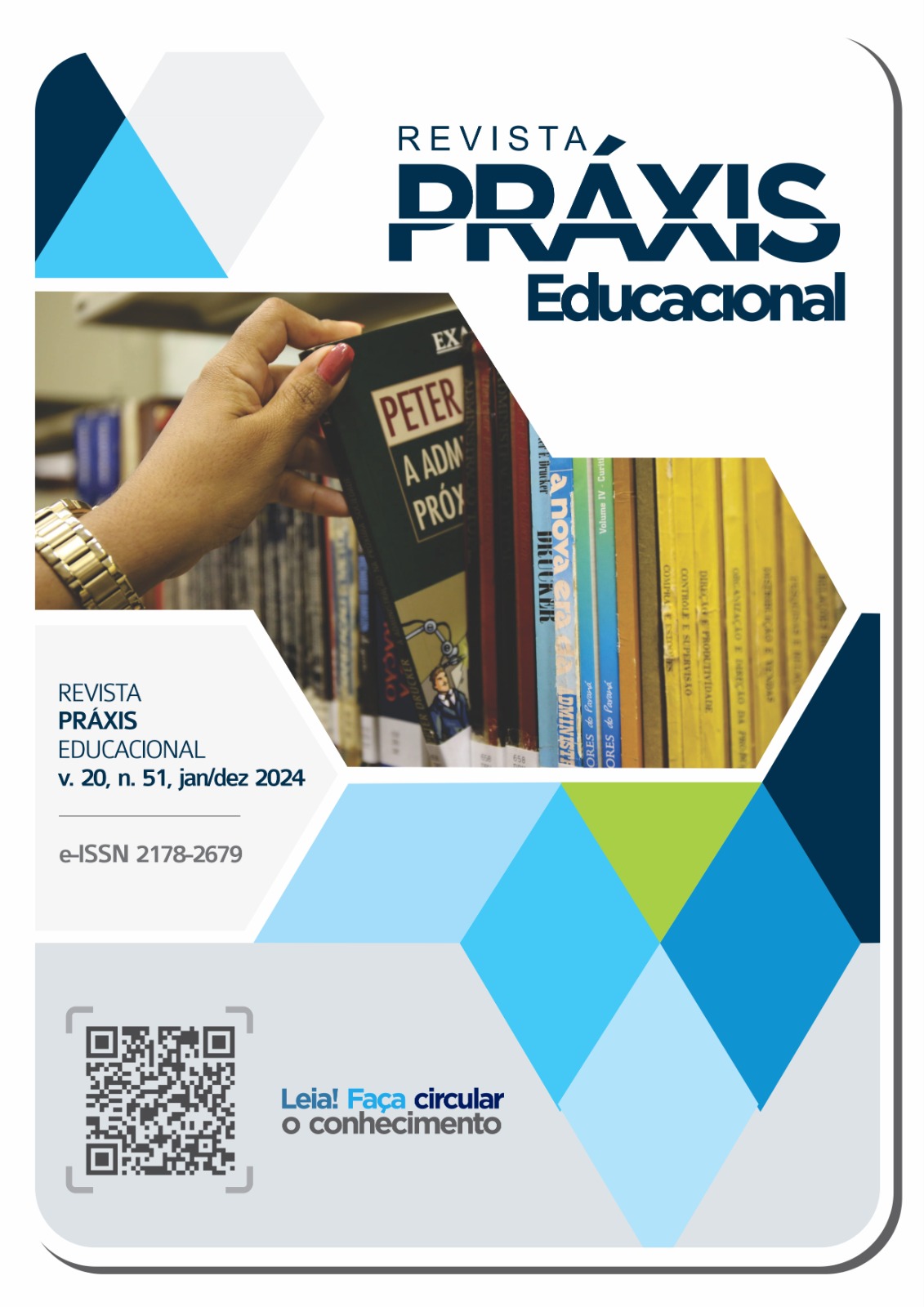De la argumento a la pasarela de la investigación narrativa: el conocimiento experiencial en la enseñanza de las matemáticas
DOI:
https://doi.org/10.22481/praxisedu.v20i51.14712Palabras clave:
investigación narrativa, enseñar matemáticas, aprendizaje experimentalResumen
El trabajo aborda narrativas de profesores del Instituto Federal del Sertão Pernambucano sobre el aprendizaje experiencial de la enseñanza de las matemáticas entretejido en la rutina diaria de enseñanza. Desde esta perspectiva, el artículo pretende comprender cómo el aprendizaje experiencial a partir de la enseñanza de las matemáticas emerge narrativamente de los procesos formativos. El estudio es de carácter cualitativo, creyendo que el sujeto y la realidad formativa se conciben como inseparables, y en el enfoque de investigación narrativa se caracteriza por ser un proceso integral/interpretativo de las narrativas y vivencias de siete colaboradores que se desempeñan como docentes de matemáticas de secundaria. en el Instituto Federal del Sertão Pernambucano. El dispositivo de investigación fue el estudio reflexivo, desarrollado en seis sesiones. Al considerar tal dispositivo para este estudio, se valoró el acto de narrar, ya que es a través de la narrativa que se tiene la posibilidad de comprender la vida y el mundo en su complejidad. A medida que se narra, se provoca que el sujeto reflexione críticamente sobre los hechos de la experiencia y, por eso mismo, estos se convierten en eventos porque están imbuidos de significados. Los resultados nos permiten concluir que el aprendizaje experiencial de la enseñanza de las matemáticas está entretejido en las relaciones micro formativas que los docentes desarrollan al habitar la profesión docente en la vida escolar cotidiana, produciendo conocimientos y experiencias vividas. El trabajo también reveló que los docentes están preocupados por las condiciones de aprendizaje de los estudiantes y por una enseñanza vinculada a la vida diaria y las necesidades de formación de los estudiantes.
Descargas
Métricas
Citas
ANASTASIOU, Lea das Graças Camargos; ALVES, Leonir Pessate. Estratégias de ensinagem. In: ANASTASIOU, Lea das Graças Camargos; ALVES, Leonir Pessate (org.). Processos de ensinagem na universidade: pressupostos para as estratégias de trabalho em aula. 6. ed. Joinville: UNIVILLE, 2006. p. 75-106.
ANTUNES, Celso. Professores e Professauros. Petrópolis: Vozes, 2010.
BRAGA, Elinaldo Menezes; LUCINI, Marizete. Estudo de experivivências: um outro jeito de fazer pesquisa. Revista Práxis Educacional, Vitória da Conquista, v. 19, n. 50, p. e13004, 2023. DOI: https://doi.org/10.22481/praxisedu.v19i50.13004 Disponível em: https://periodicos2.uesb.br/index.php/praxis/article/view/13004. Acesso em: 25 mar. 2024.
CLANDININ, D. Jean; CONNELLY, F. Michael. Pesquisa narrativa: experiências e história na pesquisa qualitativa. Tradução Grupo de Pesquisa Narrativa e Educação de Professores ILEEL/UFU. Uberlândia: EDUFU, 2015.
DELORY-MOMBERGER, Christine. Biografia e educação: figuras do indivíduo-projeto. Natal: EDUFRN; São Paulo: Paulus, 2008.
EVARISTO, Conceição. Olhos d’água. Rio de Janeiro: Pallas, 2016.
LARROSA, Jorge. Tremores: escritos sobre experiência. 1. ed. 3. reimp. Belo Horizonte: Autêntica, 2018.
LIMA, Emília Freitas de. Sobrevivências no início da docência. Brasília: Líber Livro, 2006.
LIMA, Maria Emília Caxieta de Castro; GERALDI, Corinta Maria Grisolia; GERALDI, João Wanderley. O Trabalho com narrativas na investigação em Educação. Educação em Revista, Belo Horizonte, v. 31, n. 1, p. 17-44, 2015. DOI: https://doi.org/10.1590/0102-4698130280 Disponível em: https://www.scielo.br/j/edur/a/w7DhWzM5mB4mZWLB5hthLVS/?lang=pt. Acesso em: 12 set. 2022.
NÓVOA, Antonio. Formação de professores e trabalho pedagógico. Lisboa: Educa, 2002.
TOLENTINO, Jucileide das Dores Lucas; FERREIRA, Ana Cristina; TORISU, Edmilson Minoru. Autoeficácia matemática e motivação para aprender na formação inicial de pedagogos. Educ. Rev., Belo Horizonte, v. 36, 2020. DOI: https://doi.org/10.1590/0102-4698227158 Disponível em: https://www.scielo.br/j/edur/a/Rr8j5WvqKyp7rztt3jj6ZSr/?lang=pt. Acesso em: 12 set. 2022.
RICOEUR, Paul. Teoria da interpretação. Lisboa: Edições 70, 2010.
SILVA, Américo Junior Nunes da. Formação lúdica do futuro professor de matemática por meio do laboratório de ensino. 2014. Dissertação (Mestrado em Educação) – Universidade de Brasília (UNB). Brasília, 2014.
SILVA, Fabrício Oliveira da. Formação docente no PIBID: Temporalidades, trajetórias e constituição identitária. 2017. Tese (Doutorado em Educação) – Universidade do Estado da Bahia. Salvador, 2017.
SILVA, Fabrício Oliveira da. Ensino de filosofia na docência universitária: práticas educativas na/da formação de professores de filosofia. Revista Brasileira de Pesquisa (Auto)biográfica, v. 7, n. 21, p. 307-323, 2022. DOI: https://dx.doi.org/10.31892/rbpab2525-426X.2022.v7.n21.p307-323 Disponível em https://www.revistas.uneb.br/index.php/rbpab/article/view/14641 Acesso em: 12 ago. 2022.
SILVA, Fabrício Oliveira da; LIMA, Ana Carla Ramalho Evangelista; VIEIRA, André Ricardo Lucas. Profissão docente em questão: o habitar as práticas de ensino universitário na formação de professores. Revista Práxis Educacional, Vitória da Conquista, v. 19, n. 50, p. e11576, 2023. DOI: https://doi.org/10.22481/praxisedu.v19i50.11576 Disponível em: https://periodicos2.uesb.br/index.php/praxis/article/view/11576. Acesso em: 19 dez. 2023.
VASCONCELOS, Celso dos Santos. Metodologia Dialética em Sala de Aula. Revista de Educação AEC, Brasília, n. 83, 1992. Disponível em: http://www.celsovasconcellos.com.br/Textos/MDSA-AEC.pdf. Acesso em: 23 ago. 2021.
Descargas
Publicado
Cómo citar
Número
Sección
Licencia
Derechos de autor 2024 Práxis Educacional

Esta obra está bajo una licencia internacional Creative Commons Atribución 4.0.
Usted es libre de:
Compartir — copiar y redistribuir el material en cualquier medio o formato; Adaptar — remezclar, transformar y construir a partir del material para cualquier propósito, incluso comercialmente. Esta licencia es aceptable para Obras Culturales Libres. La licenciante no puede revocar estas libertades en tanto usted siga los términos de la licencia.
Bajo los siguientes términos:
Atribución — Usted debe dar crédito de manera adecuada, brindar un enlace a la licencia, e indicar si se han realizado cambios. Puede hacerlo en cualquier forma razonable, pero no de forma tal que sugiera que usted o su uso tienen el apoyo de la licenciante.
No hay restricciones adicionales — No puede aplicar términos legales ni medidas tecnológicas que restrinjan legalmente a otras a hacer cualquier uso permitido por la licencia.










